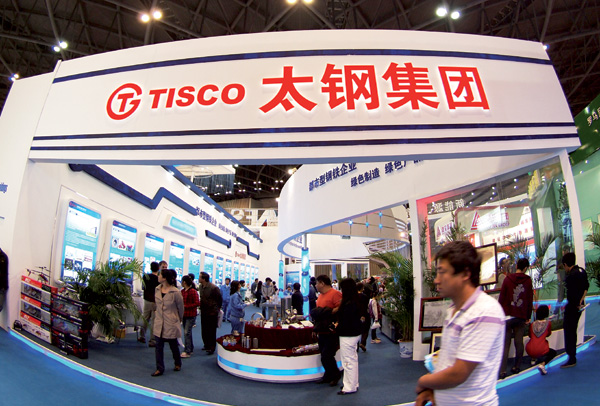TISCO proves its mettle in tough steel market
|
Taiyuan Iron and Steel Group Co Ltd's booth at a trade show in Taiyuan, Shanxi province. China's steel industry fell into a major deficit last year, with a total loss of 3.4 billion yuan ($545 million) during the first 10 months of 2012. Xu Yin / For China Daily |
Largest supplier attributes success to innovation, high-end products
It's a fact few people might know, but the metal used to make the many millions of coins in circulation in China is made in Taiyuan in Shanxi province by a company now regarded as the world's largest stainless steel producer.
Taiyuan Iron and Steel Group Co Ltd, or TISCO, is the only supplier of stainless steel to make the coins - but its products come in many different shapes and sizes, and are, of course, used in countless items which come into people's everyday lives including iPhones, cars, trains and even bridges.
Taiyuan's annual stainless steel production has increased to 3 million tons, making it the world's largest supplier, but China's steel industry as a whole is facing tough times, caused by a weak global economy and overcapacity.
To face up to the challenge, TISCO has invested heavily in developing high-end products, while it focuses more on its burgeoning stainless steel business.
Its latest financial figures show that as most domestic steel companies suffer losses, it remains on the right track.
Its 2012 revenue is expected to hit 130 billion yuan ($20.86 billion), with profits of 380 million yuan.
This year's revenue targets have been set at 140 billion, which are expected to deliver 500 million yuan in profits.
Because of the high price of iron ore and falling downstream demand, China's steel industry fell into a major deficit last year, with a total loss of 3.4 billion yuan during the first 10 months of 2012.
The country's major steel companies - which account for 80 percent of total output - had combined profits of just 1.58 billion yuan for the whole year, a 98.22 percent year-on-year drop, according to figures released by the China Iron and Steel Association last week.
However, capacity still grew in 2012 and will reach more than 1 billion metric tons, according to the association.
Against this tough trading environment, it is the quality of TISCO's high-end products that have meant it has been able to keep its head above water, while many in the industry have floundered, according to its chairman, Li Xiaobo.
"We consider our technological innovation is the key to upgrading our products to be competitive in the market.
"People always say that China's steel market is severely oversupplied, but in fact we still have to rely on imports for top high-end steel products," he said.
As the first stainless steel producer in China, the company has witnessed the development of the sector in the country, the world's biggest producer and consumer.
"Chinese stainless producers have to accelerate the level of their technological innovation to create a sustainable development model, especially when the country's stainless steel capacity has already exceeded demand, leading to fierce competition," added Li.
TISCO owns 10 million tons of capacity of which 3 million are stainless steel.
During the first three quarters of 2012, the company exported 250,000 tons of stainless steel to Europe and the United States, a 5 percent rise year-on-year.
The company plans to increase its stainless steel exports by 52 percent to 500,000 tons this year.
Li Huifeng, a senior official in its technology center, added that the company has spent heavily on research and development to raise its innovation levels, "which has helped us realize our current position in the market".
That investment has included spending 200 million yuan on two experimental platforms for technology research and new product development in the past two years.
Another 200 million yuan was spend on lab equipment.
"Technological innovation is a long-term process which should not be expected to make instant profits," said Li Huifeng.
"Despite this being a bad time for the industry as a whole, the company has continued to focus on spending on innovations."
Since 2001, TISCO has been investing about 5 percent of its sales every year on R&D.
It also spends 30 million yuan a year on bonuses to staff who make the biggest contributions to that innovation effort.
Domestic steel product prices fell about 14 percent last year because of the weak market.
However, TISCO's steel prices have increased by about 11 percent on average, thanks to its focus on high added-value products.
The competition in China's steel industry has expanded significantly in recent years.
Many more of its major steel players are seeking to make investments in upstream resources overseas, such as in Australia and Africa.
The rising price of iron ore, which has been dominated by the international giants for a long time, has forced Chinese companies to look for resources from around the world to reduce their costs.
However, finding the right investment target hasn't been easy, and many investments in mining businesses overseas have failed.
TISCO has been expanding its operations into upstream mining, but within China.
Construction of an iron ore mine will be completed this year and start production in Luliang in Shanxi.
The group owns several mines in Shanxi, which can provide about half of its iron ore supply.
By the end of 2015, the company plans to be able to supply 70 percent of its own iron ore to reduce raw material costs.
The company has also created a more reliable imported supply of nickel, an important element in stainless steel production.
It says it aims to have high-end products account for up to 90 percent of its products portfolio.
Contact the writer at dujuan@chinadaily.com.cn



















